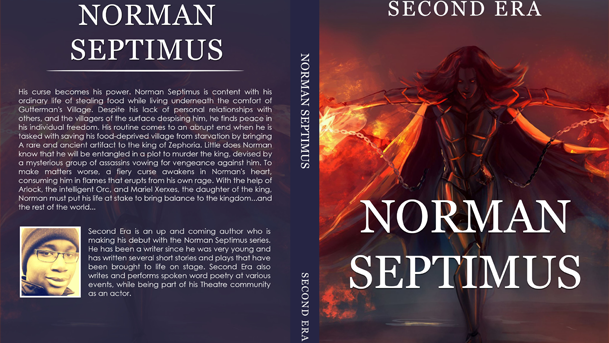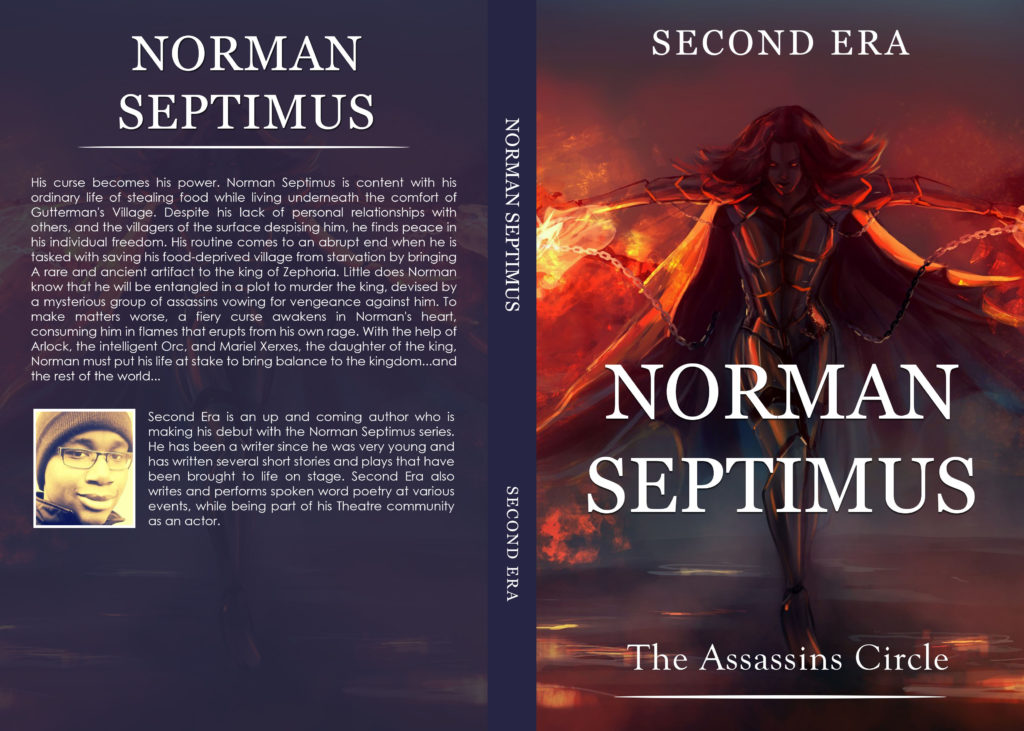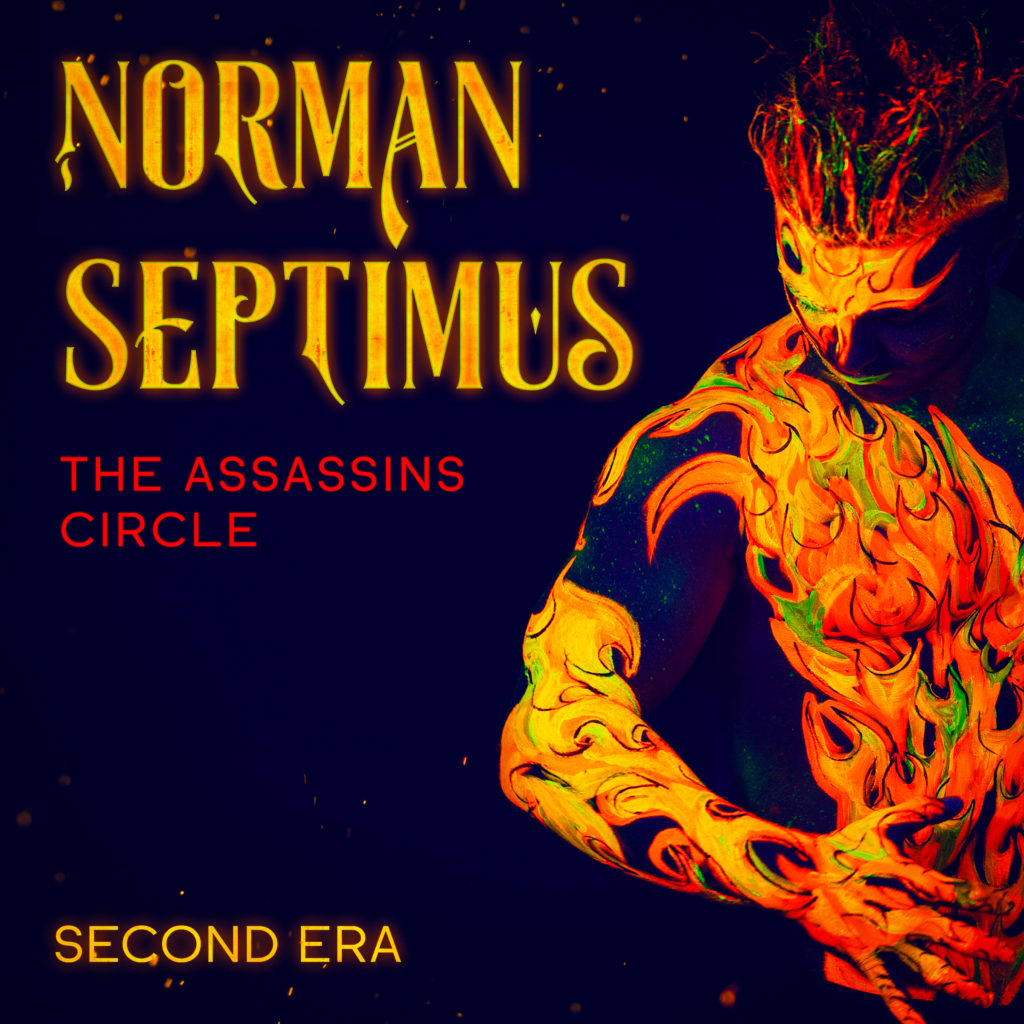Hello everyone, and welcome to our interview with Second Era, the author of Norman Septimus: The Assassins Circle, a sword & sorcery fantasy that you’ll absolutely love. Read on to see what gets Second Era’s gears moving, and to see what got him moving on his writing journey.
Tellest: Thank you for taking the time to participate in this interview with us. You wear a lot of hats—storyteller, playwright, poet, actor—so having the opportunity to learn a little bit more about you and the entertainment you’re building is tremendous!
Second Era: First, thank you for the interview, and I truly appreciate all the work you do to help writers and artists out there. I’m really excited to get the ball rolling with this novel and hopefully it will open doors to more opportunities.
T: I’m sure as you continue to write and express yourself, you’ll grow your fanbase and get many more opportunities!
Alright, so the first thing I want to know, and it’s something that I always ask everybody is… How did you get started? What inspired you to take off on this writing journey. I know that you’ve been writing since you were young, so you can take off from there, or what particularly got you moving on Norman Septimus.
SE: So, I’ve been writing ever since I was 5. I started out writing short comic books on loose-leaf paper and would hide them in folders so only I could see them. I didn’t really have a purpose for those comics, I just liked to create stories and imagery from them that I could read for my personal entertainment.
I wasn’t a straight A student in school; in fact, I sucked at subjects like Math and Science, but when it came to English or the Creative Arts, I would always excel. They were things I could understand with ease, and I even had the opportunity to read literature and study the craft of other writers. During that time, I enjoyed writing, I even wrote short stories that I would share with my friends to get their feedback. But I never thought about making it a profession—it was just a hobby for me. In high school, I was introduced to Theatre and was immediately hooked. The fact that people could bring their words to life on stage or on the big screen truly inspired me, but since being a part of a production is a lot of work, I found myself having less time to write so I made Theatre my focus until college.
I became a Theatre Major and learned so much about creativity and expression. I even took a playwriting class that helped improve my storytelling. As much as I enjoyed the craft of acting, it was stressful work. Balancing work and school took a huge toll on me and I pondered whether I took the right direction with my career. Unfortunately, in my third year of college, I had to take a break and quit school for some time. The piling of student loans and going back and forth from work all while juggling multiple roles in a production (such as acting, stage managing, etc.), I just didn’t feel happy with what I was doing. I felt that I was fulfilling the needs of others and not giving the time to take care of myself.
Before I left school, I did decide to write a play that was submitted to a festival my school was hosting. I didn’t have any confidence that it would go far—but it did. It became a semi-finalist amongst the country and was even presented as a play-read by actors. I received so much positive feedback from it that gave me hope as a writer. I studied business in school and did some outside activities related to it, so I thought to myself, “Maybe I can become a writer and create my own business. That way, I can enjoy what I do and have a sense of control in my life. Maybe writing is the doorstep to many opportunities including Theatre.”
I don’t care about being rich or famous or anything like that, I just wanted a career where I could be myself. So, I did intense research and found that there are many ways to publish a book online and create a platform. The next step: write a book. I’ve never written a full-length book and a lot of my writings were unfinished, so I didn’t even know where to begin. There were so many genres to choose from, but I ultimately decided on an original fantasy to really crank my writing skills since fantasy calls for more detail and a stylized way of dialogue, depending on the era it could be in. I don’t even remember where I got the name Norman Septimus from, it just came to me and I stuck with it ever since. While the story would be a fantasy, I wanted it to subtly represent my time in college and before I knew it, I had the whole series mapped out in my head. I created an outline of the chapters for the first book and was ready to begin.
T: You mentioned that Norman Septimus and fantasy were kind of where you landed, but now that you’ve written a book, and you’ve proven to yourself it can be done, do you find yourself circling any other genres as well?
SE: Certainly; the next book I’m writing before the second book of Norman Septimus will be in the mental health/inspirational genre, but it will still be fictional. I’m also interested in writing sci-fi, mystery, thriller, and maybe romance. I say maybe for that because I wouldn’t even know where to start with a romance novel, but it would sure be interesting to write. I just have so many ideas for different books that cater to different audiences.
T: I get a sense that ideas have already begun swirling in your head for these other projects! Do you have any tricks to remembering storylines, characters or places from one project to another? Any “world bibles” or anything like that?
SE: Actually, I don’t; but that is a good point. I should have important plot lines written down to carry through the other books. That’s a good idea.
T: When it comes to all your passions, do you find that being versed in one of them helps you with the others? For instance, you perform spoken word poetry; does that help you with your prose or your cadence or in other ways I may not be specifying?
SE: Yes! Playwriting and spoken word definitely helped me hone my writing skills; it encouraged me to use imagery and emotion in my story on a deeper meaning. I also love playing with metaphors. Acting helped me shape each character’s personality and explore their minds and backgrounds. Every person is unique and has a trait that differentiates themselves from everyone else.
T: When you’re writing all these characters with their different personalities and mental states, do you envision them as people you know? Or is there some other way you try to catalog them and position them to work with them as their stories progress.
SE: I try to make these characters parallel the real world as much as possible. Characters such as Mariel and Arlock are based on people I really know. Especially Mariel, who is, in a way, a light for Norman when he is down on himself. Norman is essentially a character based on myself and I knew someone in college who would always encourage me when I was down. In fact, one of my aspirations to write this story and the dynamic between Mariel and Norman is from her. It’s easier to write these characters with this in mind and there are and will be phrases from the characters that have actually been said in real life. The issues such as the feud between the different races are real-world elements I poke fun of. This book has many deeper meanings to it besides the main story, and I hope readers can catch them.
T: How about the world itself? Plays and acting are primarily about characters, but fantasy that’s deep and rich like this can be hard to get a handle on. You’ve done very well with your world-building though. What did you have in your back pocket, so to speak, to help you develop it?
SE: It’s weird because, just like the title Norman Septimus, the idea of the world just came to me. I took some inspiration from Skyrim and Lord of the Rings, in the world-building sense, but I wanted this world to be unique and stand on its own. It’s fun too, to be able to create characters and lore that people can read, almost like history books which contain sections of mythology. I enjoy building something that people can talk about- something that feels like it exists, like this particular world. And since there is a whole world to explore, many stories can be made with different characters besides Norman. What I like most is that this world came straight from my head- a simple idea that became something bigger.
T: Do you have any cool landmarks or lore-heavy places in the world that you can give us a sneak peek at?
SE: The City of Xerxes is like the capital of Zephoria. It is the wealthiest and most populous city in the region. The king himself resides there in the Royal Palace. This city will be explored throughout many books. There is also the Elven Institute for Spellbound. It is only mentioned a few times in this first book, but it will be a major landmark for the second one. The Institute is in Ephoria—the land of the Elves—and it is a popular place where Elves can study their history and spellbound.
T: The first Norman Septimus certainly establishes a lot of the world that you’re creating. Can you tell us anything about what might be coming next, for Zephoria or otherwise?
SE: Norman Septimus: The Assassins Circle is essentially an introduction to a much a bigger world outside of Zephoria. There is going to be more insight to Norman’s history throughout the series. All of the characters in the first book will play bigger roles in the upcoming books; in the end my hope is that the reader will feel attached to them in some way. There will also be interesting twists that will set this series apart from other respected fantasy novels.
T: Norman is clearly at the forefront, but even in the first book you have other characters who you clearly like to spend time with. Any interest in following anyone else as the primary protagonist in any future writings coming through?
SE: Definitely, Mariel and Arlock will play very important roles throughout the series. I actually plan to write individual short spin-off books for them (including king Xerxes) that will tie into the story. They will better help understand Norman’s history and character.
T: Do you have any advice for someone who might be starting off on their own storytelling journey?
SE: My biggest advice is to always find time to write, no matter what it is. It is important to make writing a habit because I can tell you, it’s not easy crafting a whole story. There were so many times where I put Norman Septimus on hold for months and jumped back on it. There was a point where I didn’t think I would ever see the day where it was finished and published. But, don’t give up, the fact that you’ve decided to tell a story is unique. Writing requires patience and backtracking. It is a breathing document while you are working on it so pacing yourself and reviewing your work will craft a well thought out, insightful story. And always remember to rest and reward yourself for the work you’ve accomplished. There is no need to rush on a novel just to send it out there.
T: What did you find to be your biggest challenge when it came to organize and launch your debut book (writing, editing, marketing, etc.)?
SE: I would have to say the editing and the marketing. Being a new author, I’ve caught myself making a lot of mistakes that I had to go back and fix. I’ve carefully read through the book numerous times, and I still find noticeable errors even after it was edited by a professional. For marketing, I would say it’s difficult because I don’t have a huge audience so getting my name out there is very time consuming. I found myself even busier after completing the book. But this is all good though; as for anyone just starting out in their career, mistakes are made and that’s how we learn. When I visualize the future, I can see myself more experienced and able to steer new authors in the right direction. Hopefully the things I’ve learned motivate others to move forward. Mistakes are a good thing, in my opinion.
T: Where can fans of your work go to follow you?
SE: I have an Instagram page called second.era, where you will find excerpts from the series as well as poetry and other creative engagements. I will also be creating a website for my blogs after Norman Septimus takes off. I encourage everyone to follow the page and support it!
T: Thank you so much for your time today! Readers can also find Second Era’s wonderful debut book, Norman Septimus: The Assassins Circle, on Amazon.
And, as a special bonus, Second Era has provided us with two book trailers for the recently released book!
Michael DeAngelo
Latest posts by Michael DeAngelo (see all)
- Sci-Fi Promo: Battlefield Earth: A Saga of the Year 3000 - April 18, 2024
- The Whispers – Chapter Ten - April 18, 2024
- Concept Art – Atalatha Arena - April 17, 2024



